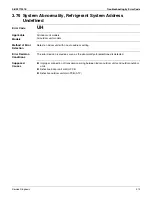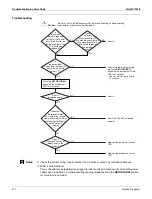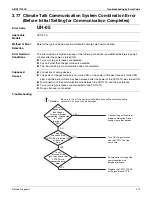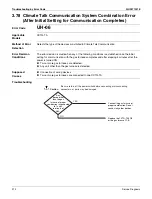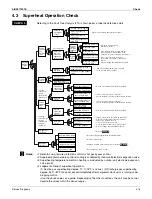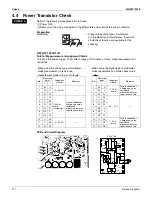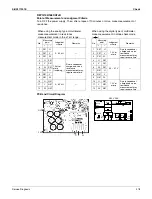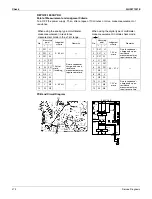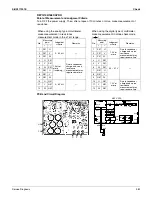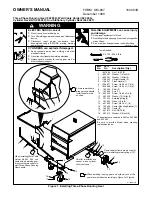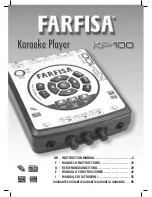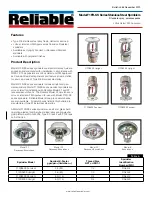
SiUS371901E
Check
Service Diagnosis
384
4.7
Vacuuming and Dehydration Procedure
Conduct vacuuming and dehydration in the piping system following the procedure for <Normal
vacuuming and dehydration> described below.
Furthermore, if moisture may get mixed in the piping system, follow the procedure for <Special
vacuuming and dehydration> described below.
Normal vacuuming and dehydration
(1) Vacuuming and dehydration
• Use a vacuum pump that enables vacuuming up to –100.7 kPa (–14.6 psi, 5 torr, –755 mmHg).
• Connect manifold gauges to the service ports of liquid pipe and gas pipe and run the vacuum
pump for a period of 2 or more hours to conduct evacuation to –100.7kPa (–14.6 psi) or less.
• If the degree of vacuum does not reach –100.7 kPa (–14.6 psi) or less even though evacuation
is conducted for a period of 2 hours, moisture will have entered the system or refrigerant
leakage will have been caused. In this case, conduct evacuation for a period of another 1 hour.
• If the degree of vacuum does not reach –100.7 kPa (–14.6 psi) or less even though evacuation
is conducted for a period of 3 hours, conduct the leak tests.
(2) Leaving in vacuum state
• Leave the compressor at the degree of vacuum of –100.7 kPa (–14.6 psi) or less for a period
of 1 hour or more, and then check to be sure that the vacuum gauge reading does not rise. (If
the reading rises, moisture may have remained in the system or refrigerant leakage may have
been caused.)
(3) Additional refrigerant charge
• Purge air from the manifold gauge connection hoses, and then charge a necessary amount of
refrigerant.
Special vacuuming and dehydration
Use this procedure if moisture may get into the piping, such as construction during the rainy season
(dew condensation may occur, or rainwater may enter the piping during construction work).
(1) Vacuuming and dehydration
• Follow the same procedure as that for 1) Normal vacuuming and dehydration described
above.
(2) Vacuum break
• Pressurize with nitrogen gas up to 0.05 MPa (7.3 psi).
(3) Vacuuming and dehydration
• Conduct vacuuming and dehydration for a period of 1 hour or more. If the degree of vacuum
does not reach –100.7 kPa (–14.6 psi) or less even though evacuation is conducted for a
period of 2 hours or more, repeat vacuum break - vacuuming and dehydration.
(4) Leaving in vacuum state
• Leave the compressor at the degree of vacuum of –100.7 kPa (–14.6 psi) or less for a period
of 1 hour or more, and then check to be sure that the vacuum gauge reading does not rise.
(5) Additional refrigerant charge
• Purge air from the manifold gauge connection hoses, and then charge a necessary amount of
refrigerant.
CHECK 8
Summary of Contents for REYQ72-456XATJU
Page 415: ...SiUS371901E Wiring Diagrams Appendix 402 REYQ144 168XATJU 2D119206A ...
Page 416: ...Wiring Diagrams SiUS371901E 403 Appendix REYQ72 96 120XAYDU 2D119207B ...
Page 417: ...SiUS371901E Wiring Diagrams Appendix 404 REYQ144 168XAYDU 2D119208B ...
Page 418: ...Wiring Diagrams SiUS371901E 405 Appendix REYQ72 96 120 144 168XAYCU 2D119209A ...
Page 421: ...SiUS371901E Wiring Diagrams Appendix 408 FXZQ05 07 09 12 15 18TAVJU 3D110443A ...
Page 423: ...SiUS371901E Wiring Diagrams Appendix 410 FXEQ07 09 12 15 18 24PVJU 3D098557A ...
Page 426: ...Wiring Diagrams SiUS371901E 413 Appendix FXMQ07 09 12 15 18 24 30 36 48 54PBVJU 3D093209B ...
Page 428: ...Wiring Diagrams SiUS371901E 415 Appendix FXHQ12 24 36MVJU 3D048116C ...
Page 429: ...SiUS371901E Wiring Diagrams Appendix 416 FXAQ07 09 12 18 24PVJU C 3D075354D ...
Page 435: ...SiUS371901E Wiring Diagrams Appendix 422 VAM1200GVJU 3D073270D ...
Page 437: ...SiUS371901E Wiring Diagrams Appendix 424 1 4 2 Multi Branch Selector Unit BS4Q54TVJ 3D089123B ...
Page 438: ...Wiring Diagrams SiUS371901E 425 Appendix BS6 8Q54TVJ 2D089122B ...
Page 439: ...SiUS371901E Wiring Diagrams Appendix 426 BS10 12Q54TVJ 2D089121B ...
Page 440: ...Revision History Month Year Version Revised contents 04 2019 SiUS371901E First edition ...

